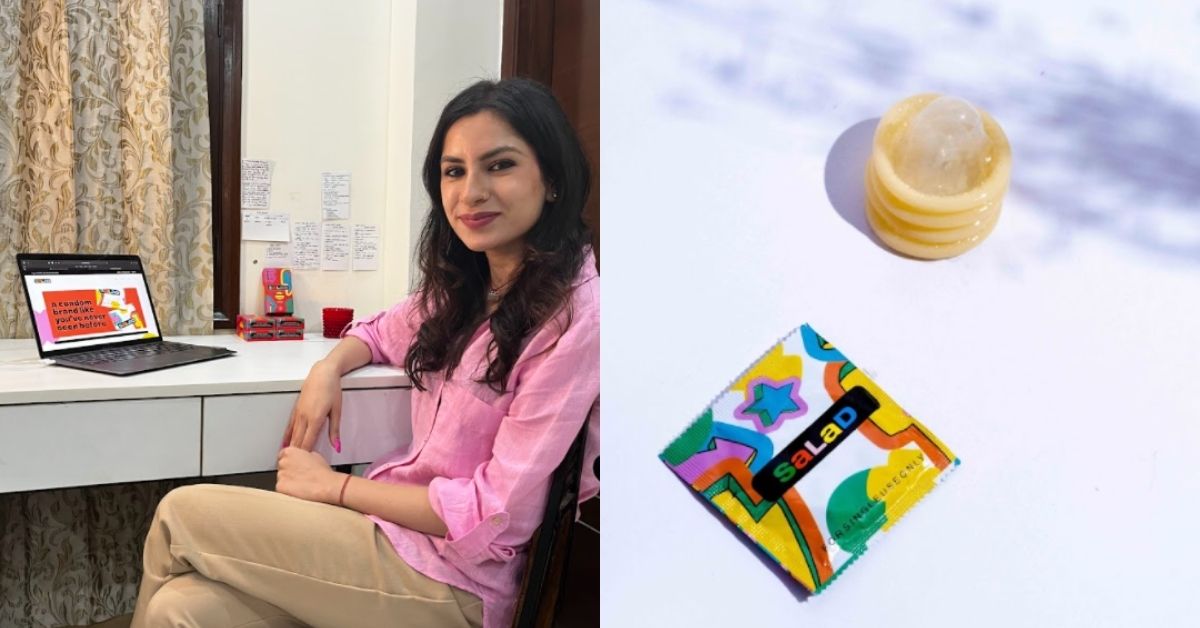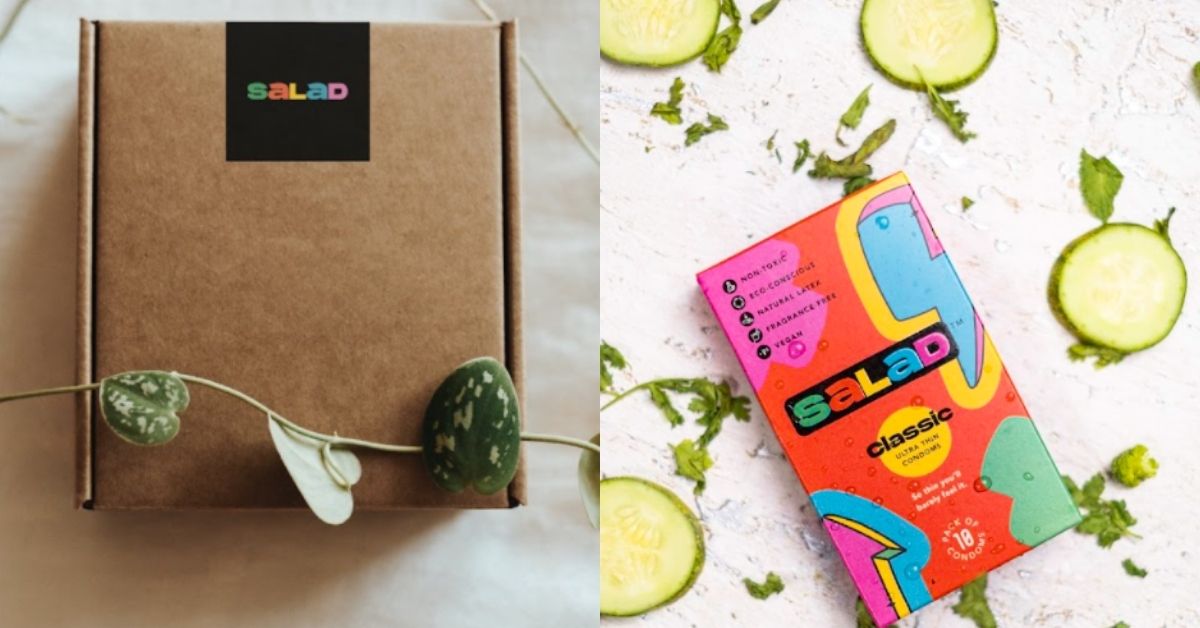What image do we conjure when we hear the word ‘condom’? The 2017 government ban on advertisement of the contraceptive between 10 am and 6 pm can give us a hint — salacious and hyper-sexualised ads that breed indecency and “promote unhealthy practices” in an otherwise sanskaari society.
This hush-hush and behind-closed-doors perception of sex and contraception is jarring when you realise that India ranks third in the world when it comes to HIV cases, and that the number of unwanted pregancies are likely to reach a whopping 23 lakh due to little to no availability of contraception methods amid the lockdown.
Aruna Chawla, a 26-year-old entrepreneur from New Delhi, found similar stats when she was conducting surveys a few years ago. While making a slow transition to consumer psychology, practicing as an art and fashion consultant, she found that the adoption rate of condoms was at only 5.6 per cent in India, despite it being the most easily available form of contraception here.
“So it was obvious that there was a glaring gap, and that there had to be more to such a skewed purchasing pattern,” she notes in conversation with The Better India. “For purely academic purposes, I spent two years conducting research on this, which eventually led me to realise that it’s not the physical or price accessibility, but the social acceptability of condoms that is lacking.”
She adds, “Even in big cities like Delhi, you don’t generally want to be seen buying a condom. In rural areas, this inaccessibility results in increased costs when it comes to availing contraception — travel costs, doctor charges, the cost of the process, etc. So then the other option is to not take the trouble and do nothing about having safe sex.”
Needless to say, the burden of unwanted or unplanned pregnancies falls on the woman. A study conducted by the International Centre for Research on Women stated that women bear a larger burden of contraception due to increased awareness, while men, who are actually the decision-makers in most homes, are ill-informed and remain unwilling to engage in family planning.
“This led me to thinking that my unique background, combined with what my research showed me, would allow me to make a shift in the narrative,” says Aruna, who began her career by practising law, but eventually realised it was not for her. “It’s not just about building a profit-churning business — there’s a massive social component to this problem that needs urgent addressing before we can think about things like ‘sustainable development’.”

Salad Condoms
In June 2020, Aruna used her funds to launch Salad, a startup that sells vegan, non-toxic and eco-conscious condoms. These use natural latex that are fragrance-free, and come with recyclable packaging.
While continuing her research, she began by approaching manufacturers around the country. It was challenging, she notes, to find someone who not only understood her mission, but also treated her with respect as a woman.
“I preferred not disclosing my age, because the moment I told them I was 25, they would believe I was just a kid looking to waste their time. One thing I heard constantly was, ‘Why don’t you make us speak to your husband, or father? Humein iss baare mein ladies se baat nahi karni (We don’t want to talk about these things with women)’. And of course, I haven’t found a single woman manufacturer as of now,” she notes.
The last aspect was surprising to Aruna when she considered how, ultimately, the contraceptive exists for both men and women. “Women make up for almost 50 per cent of the country’s population. Yet, you find them missing from the discourse — condom ads are generally marketed towards men, and women aren’t involved in the decision-making process,” she says.
In January this year, Aruna zeroed in on a manufacturer, and things picked up from there.
“What’s interesting is that because condoms are an essential medical commodity, brands aren’t obligated to disclose the ingredients. The pharmaceutical department regulates their research, price ceilings, etc. But if we were going to start talking about normalising condoms and safe sex, we had to know what was going on behind the scenes, and what is going into our bodies. If you Google questions that Indians are asking about using condoms, you find there’s a lot of misinformation and ignorance around it. So I thought it would be important for us to talk about what ingredients go into our brand,” she explains.
On Salad’s packaging, there is a QR code that one can scan to land on a section of the website that details what ingredients are being used to make the condom. It also details what each ingredient means, what benefits it has, and more.

When it comes to being ‘vegan’, Aruna says that aspect does not have much impact on their marketing or USP. “Veganism and vegetarianism in India have many connotations of class and caste divide in a country like India,” she notes.
“Our idea was to use the vegan aspect as a talking point. Most condoms use an animal by-product called casein to beat the rubber into thin sheets. In the last few years, as technology has improved, we now have the means to develop condoms that don’t need animal by-products,” she adds. “So for Salad, it’s just about doing the right thing.”
Salad’s eco-conscious thinking also comes into play when it comes to shipping and receiving. Orders are dispatched only twice a week to minimise transportation costs, reduce the burden on delivery personnel for small trips, and minimise usage of overall resources. They pay per box regardless, so the earnings of the delivery personnel don’t suffer, Aruna says. “There’s very little fluff about the product as well — we don’t hand out gift cards or hampers to minimise wastage.”
Salad’s condoms are priced at Rs 91, and shipped all over India through their website.
They are currently in talks with online retail platforms to make their products available there as well. They also donate 15 per cent of their profits to help improve access to sex-ed in Indian schools and colleges, she notes.
Talking About Safe Sex
“As a woman, every move you make is closely watched, especially when it comes to launching a business. As a young entrepreneur, there’s many more things at stake. When you run a business, your name, your family’s name, it’s all attached. So I wanted to focus on not being the face of the brand,” she says.
The day Salad launched, Aruna received an influx of unsolicited messages and trolling on her social media. But she leads a relatively quiet social media life, and admits, “I’m wary of threats and attacks if even one thing goes awry.”
She asserts, “My products do talk about sex, and aren’t necessarily only female products. They call for the involvement of men as well. So that challenges a lot of notions.”
Aruna says there’s a long way to go, and that Salad is working on launching new products. They’re also looking to collaborate with sex educators and creating workshops.
For more information, you can visit Salad’s website, or their Instagram page.
Edited by Yoshita Rao
No comments:
Post a Comment